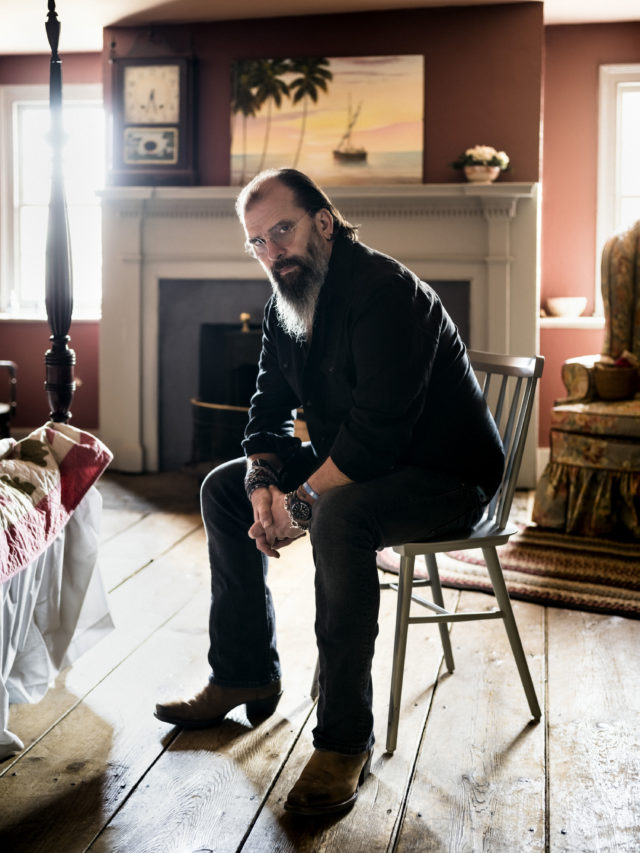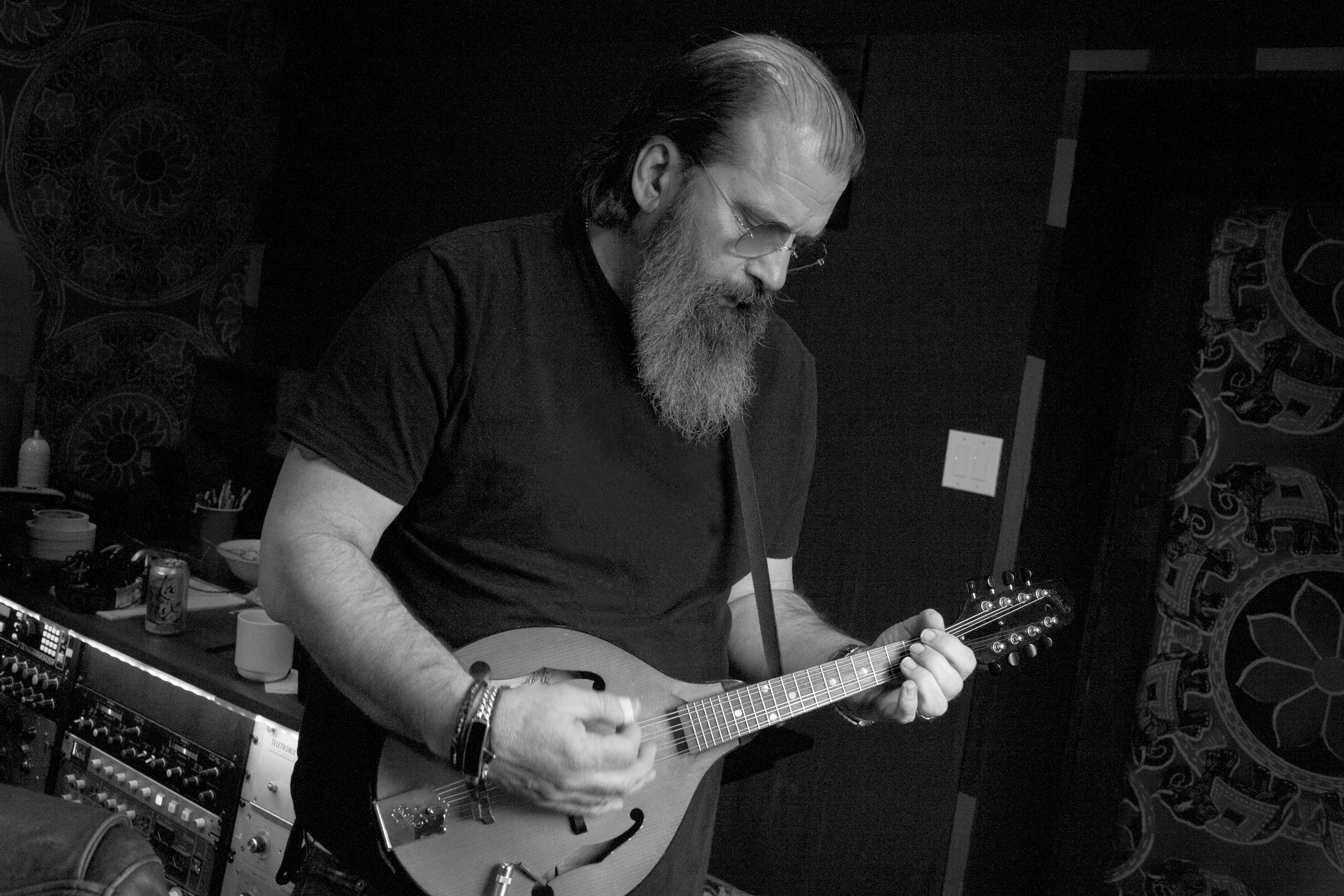
When Steve Earle looks in the mirror, he doesn’t see his bald head, his graying beard or his 62-year-old body. No, when the country rock legend comes to stand in front of the mirror he raises his gaze to look his 20-year-old self in the eye.
“Maybe I’m delusional, but I just don’t see myself as I am… I just don’t feel that old,” he says before offering a litany of ailments that beg the contrary, a list of the aches and pains he’s accumulated over the years living a life on the road. But all of that’s gotten better, on account of all the yoga, he says. “My biceps actually do look like I’m 20.”
Despite what he sees in the mirror, Earle is a grizzled guy and his music is an appropriately gnarled expression of all he’s weathered in his life. It’s been a life spent on the edges of society, and he wears his bruises as proof and with pride.
Earle’s always taken a no-nonsense stance on life, and he shares what he goes through freely. There’s almost nothing he won’t talk about, no story he hasn’t told — from his early days standing in the air traffic control tower with his dad, to his middle years spent in the depths of heroin addiction, to his always tenuous, strict and ongoing two-decade long sobriety. Earle’s life is an open book.
Historically, this sort of tenacious honesty has not been rewarded by society, and so folk artists and poets like Earle are left at the fringes — a curse in that it’s a placement that comes with loneliness, but a blessing in that it offers searing insight into what we as humans share.
But lately, the cowboy’s bravado has fallen into society’s high graces. He’d hate this comparison, but Earle is a bit like Bizarro World’s President Trump, appealing to blue-collar America with a no-holds-barred demeanor. But where Trump will, as Earle says, “do whatever it takes to get the working man to vote against his own interests,” Earle is only interested in offering his art to the people who are as bruised and battered by life as he is.
When it comes to the alt-country-Americana tradition Earle is part of, the one he helped to build, he’s been served well by his ability to turn his outcast status into the hero’s tale, and, over the course of his career, to turn the outcast into the mainstream. The result is a compendium of songs that speak to broader themes of life in America — the kind that sound best when wafting through the beer-stained and humid air of a dark bar, muddled just a little by all the peanuts padding the floor.
His latest album sounds just as good, although the youthful arrogance of Earle’s rock ‘n’ roll is notably diminished in favor of a more reflective tone. So You Wanna Be an Outlaw is a look backwards at what it was like to go from 20 to 62 and back again, Earle looking at the boy he sees in the mirror who is defiantly charging ahead at the life laid out in front of him.
In the album’s liner notes, Earle writes: “I’ve been attending an awful lot of funerals lately and maybe that alone explains my sudden need to acknowledge where I come from, to revisit the solid foundation upon which I have constructed this house of cards of mine.”

The album is a tribute to those with whom he has shared his life and music, and it’s Earle at his poetic best. For most of his career it was the sound of Earle’s unique breed of country rock that tended to garner attention, but now the music is more humble, secondary to Earle’s lyrical prowess — lyrics laid out like stanzas of an epic tale.
There’s no better example than in the album closer, “Goodbye Michelangelo,” Earle’s eulogy to his recently passed mentor and friend Guy Clark. In bidding farewell to his “maestro” he evokes an artistry reminiscent of Walt Whitman’s “O Captain! My Captain!” wherein the poet laments:
“But O heart! heart! heart!/O the bleeding drops of red/Where on the deck my Captain lies/Fallen cold and dead.”
Likewise, Earle constructs his lines with the same attention to literary device and detail, but instead of relegating them to the pages of poetry, he lets them loose to ramble around inside a soft country melody:
“So long my captain, adios/Sail upon the sea of ghosts/Chase the white whale to the end/Bring the story back again.”
The entire album is an exemplar of the literature of Earle — the outlaw poet. He’s long been a man of the written word, not just with lyrics but with fiction, theater and poetry, including an entire year spent documenting his life in haikus.
Nearly a decade ago, Earle was quoted by the New York Times as saying he believed that in the wake of the Beatles and Bob Dylan he realized it might be possible to create songs that could be “literature that you can consume while driving in your car.” Now, just months after Bob Dylan was awarded the Nobel Prize in Literature, Earle says he “totally supports” the broad recognition of that once far-out idea that music claims and deserves the erudition of fine art.
“Bob Dylan basically invented my job,” he says. “I like to think that what I am doing is literature and Bob just legitimized that for all of us. … Dylan was trying to write stuff that held up to fringe poets and the beats, and he did it. Sure, other people were trying to do it too (notably for Earle, Cole Porter), but Dylan, well, he was just better than everybody else. He really was a genius.”
Genius is not a term Earle uses lightly, saying it’s got nothing to do with smarts but rather the performance of something at such a high level that it allows for it to become something that never existed before. By that measure, Earle, having spent a life defining himself by the rules he breaks — and why he breaks them — is a genius of outlaw.
But genius is also elusive and requires constant nourishment for its satisfaction. At 62, Earle is still after it. But this isn’t about him versus the world, it’s about making peace with what lies deep inside himself.
Around two years ago, or about “20 years after I should have,” Earle started practicing yoga as a sort of invocation of meditation and prayer. As these things go, it came to be through a rather synchronistic chain of events — taking a fall in a river on a fishing trip, meeting Ram Dass on his 60th birthday, being connected with a yoga teacher back home in New York. But, Earle brushes over the specifics only to say, eagerly and resolutely: “Yoga changed my life. It’s a big deal.”
You have to rummage a bit to figure out just how his six-day-a-week practice has affected him. The fruit seems to be mostly in little, mundane accomplishments. Like the fact that Earle has at last found a home and no, it’s not in his famed 40-foot-long Eagle tour bus but in his Manhattan apartment with his wife and 7-year-old son.
“I still love the road and I am still at peace with it — which is good because if you’re not, it will kill you, and fairly quickly, too,” he says. “But I love New York and 13 years after moving there it feels like home — I miss it when I am gone and I cherish it when I’m there. New York has a way of staying still and yet you still feel like you’re moving.”
It’s not the same Earle that we’ve gotten used to and he admits it — his life is changing in profound ways. It’s no longer just a story about sobriety, or quitting smoking or about a harried life fighting against The Man. It’s about what happens, as Ram Dass would say, here and now.
On the Bill: Steve Earle & The Dukes. 8 p.m. Friday, Aug. 4, Boulder Theater, 2032 14th St., Boulder, 303-786-7030. Tickets $25-$30.














